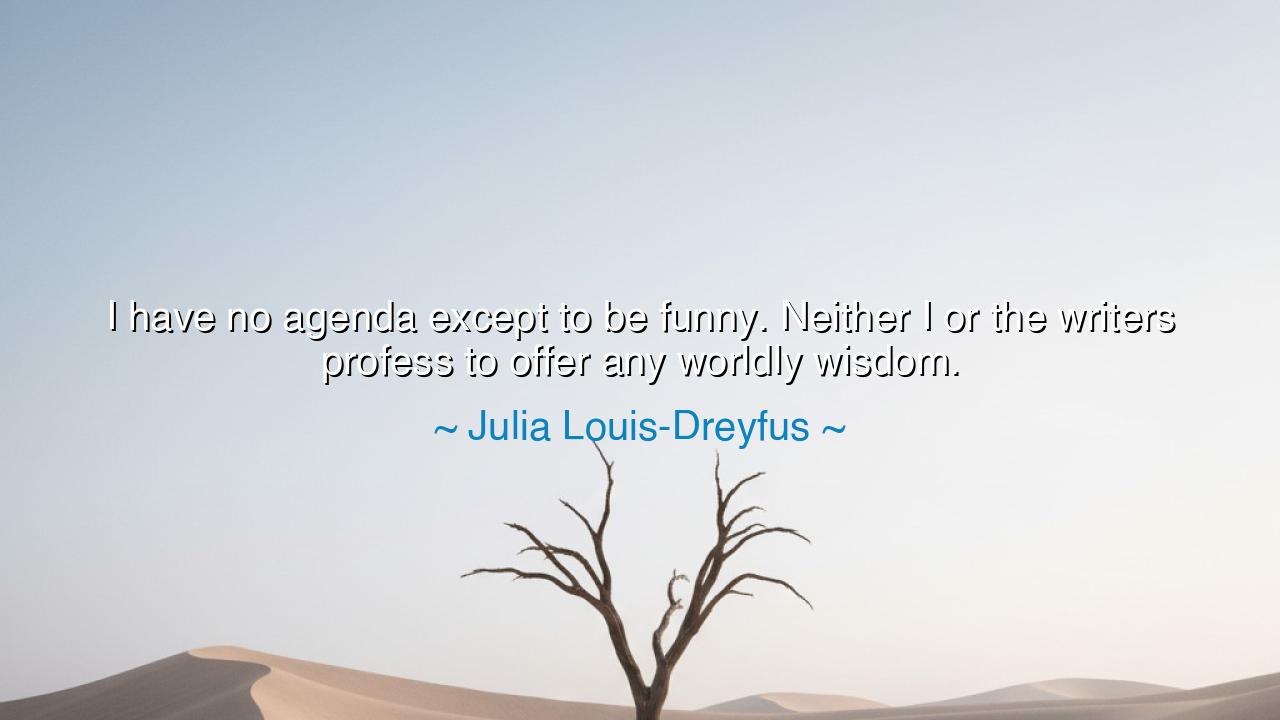
I have no agenda except to be funny. Neither I or the writers
I have no agenda except to be funny. Neither I or the writers profess to offer any worldly wisdom.






Julia Louis-Dreyfus, mistress of comedy and bearer of laughter, declares with humility: “I have no agenda except to be funny. Neither I or the writers profess to offer any worldly wisdom.” In these words lies a paradox as old as theater itself. For though she disclaims the mantle of philosopher or prophet, her devotion to humor becomes in itself a form of wisdom, reminding us that joy, laughter, and levity are among the deepest needs of the human spirit.
The meaning shines with simplicity. In an age where every voice strives to persuade, to argue, or to command, Louis-Dreyfus confesses no agenda beyond laughter. She places herself in the ancient tradition of jesters and comic poets, who, by making men laugh, often revealed truths too sharp to be spoken plainly. Yet here she insists: her work is not cloaked in grand intent, but in the purity of funny—a gift that heals, relieves, and unites.
History confirms the power of such modesty. In ancient Athens, the comic playwright Aristophanes filled the stage with jokes and absurdities. He claimed no divine mission, yet through his laughter he exposed the follies of politicians, the excesses of war, and the vanity of philosophers. His plays, while professing no worldly wisdom, nonetheless carried lessons that reached deeper than many solemn speeches. So too Louis-Dreyfus, by making light, gives her audience space to breathe and to see the world with new eyes.
Her statement is also a reminder of humility. Many who hold the stage mistake their platform for a throne of truth. Yet to disclaim the crown, to confess no wisdom, is itself a rare act of wisdom. In seeking only to delight, she avoids the trap of preaching, allowing her art to remain free, unburdened, and universal. Laughter needs no creed, no faction—it is a language understood by all.
Therefore, let us honor the one who brings funny without agenda, for such a gift is precious. To laugh is to remember our humanity, to find courage in the midst of sorrow, and to glimpse the lightness of life even under heavy skies. Though she claims no worldly wisdom, Julia Louis-Dreyfus teaches by example: that joy itself is wisdom, and that to bring laughter into the world is no small calling, but a noble one.






GNGia Nhu
This quote makes me think about the role of comedy in society. Is it enough for humor just to entertain, or should it also challenge us to think differently? I respect Julia’s stance—sometimes laughter itself is healing and that’s enough. But I also feel that comedians often end up being accidental philosophers. Whether they intend it or not, the funniest observations usually come from deep insight into human behavior.
BBi
There’s a sincerity here that I admire. In a world where everyone wants to be taken seriously, claiming no higher purpose beyond humor feels almost rebellious. Still, I’d question whether it’s truly possible to separate humor from meaning. Even satire disguised as silliness can carry cultural critique. Could her insistence on having ‘no agenda’ be a way of protecting comedy’s freedom from being politicized or overanalyzed?
HPNguyen Hoang Phuc
I think this perspective is quite freeing. It removes the pressure to turn comedy into philosophy and reminds us that laughter is valuable on its own. Yet, I can’t help wondering—whether comedians like Julia Louis-Dreyfus, through timing, tone, and context, unintentionally end up shaping how people think. Is it possible to entertain without influencing? Maybe the act of making people laugh already contributes something profound to how we see the world.
TVTrang Vo
As a fan, I find this statement both modest and thought-provoking. It suggests that humor doesn’t need to carry a message to matter. But can entertainment really exist without some underlying worldview? Even jokes rely on shared understanding or commentary on life. Maybe the absence of a moral agenda is itself a kind of statement—a reminder that joy and laughter don’t need justification to have value.
GHTran Gia Han
This quote makes me smile because it captures something honest about the nature of comedy. It’s about connection and joy, not moral preaching. But at the same time, isn’t laughter itself a kind of wisdom? Comedy often reveals uncomfortable truths through humor. I’d love to know if Julia genuinely believes humor can be separate from insight—or if she’s just downplaying the intellectual side of her craft to keep it accessible.